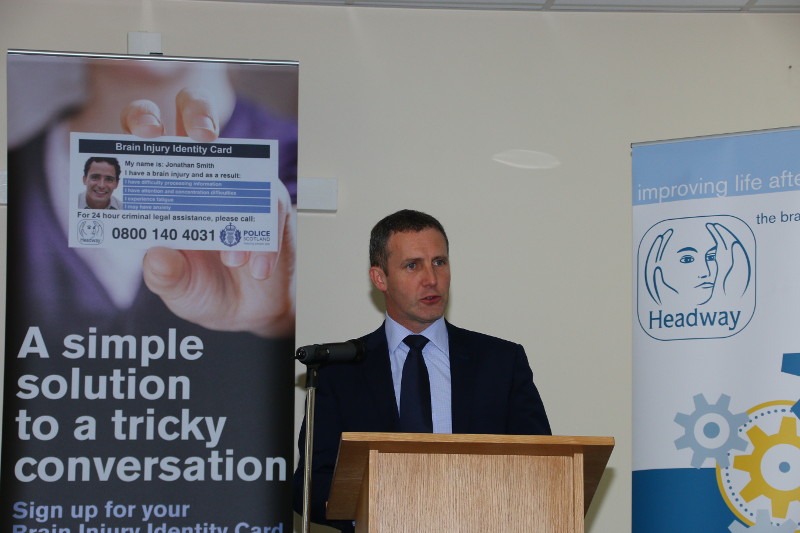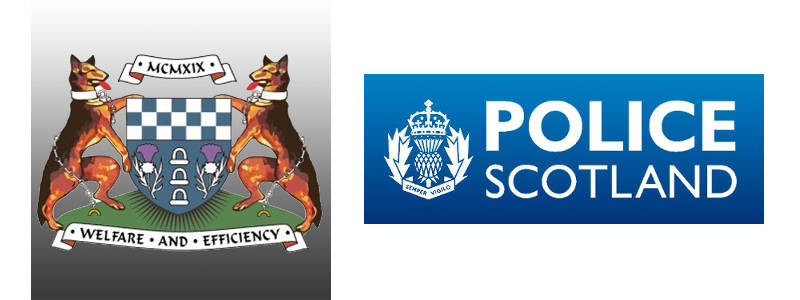Speaking at an event in Falkirk on 26 October, Michael Matheson MSP introduced the Brain Injury Identity Card, which is provided by leading brain injury charity Headway and endorsed by Police Scotland, the Scottish Police Federation, and the Scottish Appropriate Adult Network.
The card is designed to help the police to identify brain injury survivors at the earliest opportunity, ensuring they receive suitable support and are diverted away from the criminal justice system where appropriate.
The card, which is part of the charity’s wider Justice Project, has the additional benefit of breaking down social exclusion, providing card holders with renewed confidence in the knowledge that they can easily explain their support needs should they require assistance in everyday situations.
Mr Matheson said: “Scotland’s health and justice systems need to work closely together if we are to successful tackle health inequalities, reduce reoffending and improve the lives of the individuals that use these services.
“The new brain injury ID card will help police identify brain injury survivors and ensure they get the support they need when they come into contact with our justice system. I’m grateful to Headway for their work on this project and hope that it will lead to a wider understanding of the needs of brain injury survivors.”

The clinically-verified photo ID cards list some of the often hidden and misunderstood effects of brain injury that are experienced by the individual card holder. They also carry the Police Scotland logo, which helps to add authority to the card and ensure it is recognised by officers.
Peter McCabe, Chief Executive of Headway said: “We are delighted that the Cabinet Secretary has taken time out of his busy schedule to officially launch this vital project in Scotland.
“The often hidden and widely misunderstood effects of brain injury can often lead to difficulties for survivors in their everyday lives.
“Many people are assumed to be drunk as a result of having slurred speech or an unsteady gait, with attempts to explain the effects of their brain injury often in vain.
“Sadly, this can lead to brain injury survivors being arrested as a result of their disabilities not being recognised or understood.
“This card helps police to quickly identify brain injury survivors, saving precious resources and enabling frontline staff to better provide the appropriate support.
“The card also has the additional benefit of breaking down social exclusion, with card holders having renewed confidence in the knowledge that they can easily explain their support needs should they require assistance in everyday situations.
“It is a simple solution to a tricky conversation.”
Changing lives
Attendees at the launch also included brain injury survivors who have encountered difficulties in common day-to-day scenarios and are now benefiting from carrying a Headway Brain Injury Identity Card.
Callum Maclean, was a commercial fisherman for more than 20 years and a qualified welding inspector before a brain tumour changed his life in 2011.
The tumour left him with a number of problems such as impaired balance, affected temperament and limited mobility.
These symptoms have brought many challenges, including dealing with the often inappropriate ways people react to his disabilities.
Callum said that the card will enable him explain his symptoms and help cut down on people’s misconceptions around him.
He said: “I suffer from impaired balance which can cause me to stagger and it can look as if I am drunk or under the influence of drugs.
“This has drawn attention from the police and they have watched me closely as I have crossed the road or when I’m a football matches.
“I have also been treated differently by staff in shops and restaurants including a comment being made by an assistant suggesting that I had been drinking.”
Callum said carrying the card would bring him confidence, especially when he was feeling tired.
He said: “When I am tired I struggle to communicate and this can be very stressful when I’m out on my own.
“But now with the card, I don't have to explain myself to strangers, the information is all there. It's like having back up plus there is a phone number for legal assistance too just in case anything was to happen.”

Superintendent David Pettigrew, Police Scotland's Safer Communities team
"Brain injury survivors can find themselves coming into contact with the criminal justice system as victims or when they have been arrested.
“When we were first approached about this project, the benefits were immediately obvious – both to those holding the cards and indeed to Police Scotland.
“The Brain Injury Identity Card is designed to help police officers more easily identify brain injury survivors and ensure that they receive an appropriate response.
“By working together with Headway, we can not only provide better support to brain injury survivors, but it could also save precious police resources."
Andrea MacDonald, Chair of the Scottish Police Federation
“This is a very worthy project which will undoubtedly make life easier and more importantly safer for members of the public who are brain injury survivors.
“It will also be a valuable tool for our members to help them identify brain injury survivors who are in custody or whom they otherwise encounter during their duties and thereafter ensure that these individuals receive the necessary support and medical assistance.
“The Scottish Police Federation is pleased to support the project alongside the Police Service of Scotland and the Scottish Government.”
Karen Donoghue, Chair of the Scottish Appropriate Adult Network
“The Scottish Appropriate Adult Network welcomes the introduction of the Brain Injury Identity Card. Any measure that can assist the right people getting the right help at the right time can only be a good thing.”
“The Card may give reassurance to those who carry it, but can also assist Police Colleagues in determining when it may be necessary to request an Appropriate Adult. The card in itself is not a criteria for needing an Appropriate Adult because each person is affected differently in different circumstances but should form part of the assessment made by the officer at the time.”
Back










